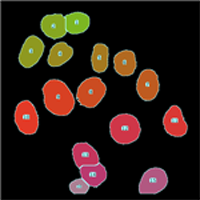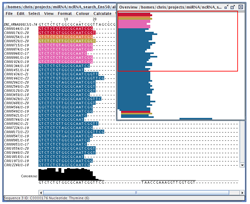|
Summary
The Data Analysis Group (DAG) is a team of scientists with strong computational skills who can collaborate on short or medium term bioinformatics projects and provide advice. The DAG can analyse large datasets (e.g. from microarray, next-generation sequencing, proteomics, imaging) to extract biological knowledge and also develops innovative software and databases. Work carried out with the DAG may lead directly to joint publications and generic software, and/or provide the groundwork for a grant application that would include a dedicated computational position.
Background
The DAG has grown from and is co-located with Prof. Geoff Barton's  Bioinformatics research group and
has expanded this year from an initial appointment in 2006 (Chris Cole, SBRN) through close collaboration with the GRE Centre which has
funded two new positions in the group (Pieta Schofield and Marek Gierlinski). A further position has been supported by SULSA (Nick Schurch).
Sustainability of the DAG is being achieved by funding from a mixture of sources including Geoff Barton's grants, Doreen Cantrell's grants, and percentages of some other BBSRC and Wellcome Trust grants. Bioinformatics research group and
has expanded this year from an initial appointment in 2006 (Chris Cole, SBRN) through close collaboration with the GRE Centre which has
funded two new positions in the group (Pieta Schofield and Marek Gierlinski). A further position has been supported by SULSA (Nick Schurch).
Sustainability of the DAG is being achieved by funding from a mixture of sources including Geoff Barton's grants, Doreen Cantrell's grants, and percentages of some other BBSRC and Wellcome Trust grants.
The bioinformatics groups at Dundee have always collaborated with
experimentalists. Collaboration on a specific biological system (e.g. kinases or glycosyl transferases) has led to new general studies of proteins, new computational techniques and databases. In the past
we have been able to contribute to collaborations when the goals of the research have been in line with our existing research
grants. However, there are many opportunities to do interesting science at the interface between computing and biology that require more time to be dedicated than is possible with this model and
yet are not large enough at the outset to justify a full grant application. The Data Analysis Group (DAG) enables a larger range of collaborations to be carried
out between the "dry" bioinformatics research labs and different "wet" groups across the College of Life Sciences and other Scottish institutes. when the goals of the research have been in line with our existing research
grants. However, there are many opportunities to do interesting science at the interface between computing and biology that require more time to be dedicated than is possible with this model and
yet are not large enough at the outset to justify a full grant application. The Data Analysis Group (DAG) enables a larger range of collaborations to be carried
out between the "dry" bioinformatics research labs and different "wet" groups across the College of Life Sciences and other Scottish institutes.
Who can work with the Data Analysis Group?
Anyone who might have collaborated in the past with Geoff Barton
or David Martin can work with the group. We have SULSA funding and are particularly open to collaboration with scientists throughout Scotland.
How do I work with the Data Analysis Group?
You can make initial contact with Geoff Barton, David Martin or with
any member of the team to discuss the kind of challenge you are facing. If it looks like the sort of project we might be able to work
with, then we ask that the leader of your group writes a short (2-3 page) description of the problem so that we can consider it at our weekly group meetings. Although we can often make more of data
you already have, it is much better if you can talk to us before you generate a lot of data as we may be able to help you optimise an experimental strategy, or in some cases eliminate the need for an experiment.
Management of the Data Analysis Group
Prof. Geoff Barton leads the group and is assisted by Dr David
Martin. The team collectively discusses and decides project allocations. A management group exists currently centred on the GRE Centre and helps prioritise projects.
|

